Brandon Stanton's Blog, page 164
August 17, 2016
(3/3) “After I had the flashback that night, two of the guys on...
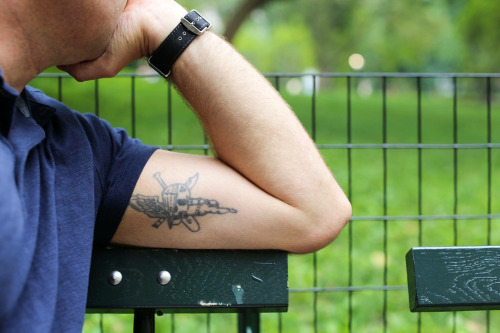
(3/3) “After I had the flashback that night, two of the guys on my team came up to me and said: ‘You’re getting help.’ I said: ‘No I’m not.’ And they said: ‘Yes you are. Most of us do.’ And that finally convinced me. I’d never gotten help because I never wanted to appear weak. I’m the son of a man who lost his entire team in Vietnam. I’ve been through some of the toughest training on earth. I never quit anything in my life. So it took me the longest time to admit that I had a problem. Whenever I saw a homeless vet, or an alcoholic vet, I’d say: ‘That’s not me. I’ve got a good job. I’ve got a family.’ I did my best to cope with my issues through physical exertion. I threw myself into work. I’d go for long swims in the morning and long runs at night. I thought if I never stopped moving, I could hold down my stress. But it finally caught up with me. And I broke down. And those two guys convinced me to go to therapy. And it was the best decision I’ve ever made. I used to think that I was weak for needing help. I realize now that my weakness was never getting it.”
(2/3) “I kept having these nightmares of being trapped in a...
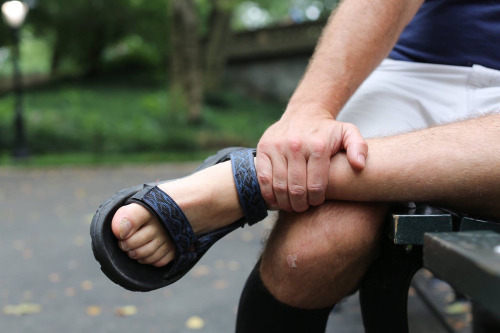
(2/3) “I kept having these nightmares of being trapped in a burning vehicle. They were non-stop. I’d wake up screaming and I couldn’t breath. I wasn’t sleeping at all. I was overworked and going through a horrible divorce. At the time I was working as a medic on a SWAT team, and one night at work I had a really bad flashback. We were about to serve a warrant. All of us were in the back of a truck and it was completely dark because we were preserving our night vision. And somebody turned on a red flashlight to adjust their equipment. And I’m seeing our shadows on the wall, and suddenly I think we’re in a helicopter. And I’m trying to fight it but it seems so real. I’m telling myself, ‘Keep it together. Keep it together.’ I know it’s not real but I’m actually smelling the fuel and hearing the sounds of the turbine. And then the back door opened. And the next thing I know, I’m standing on the third floor of this building with no idea how I got there. And that was the last raid I ever did. We had a training session later that week. Afterwards I closed myself in a van, put down my rifle, and started to cry. I was stressed to the hilt. The next day I started looking for help.”
(1/3) “I was inside an armored carrier with my platoon...
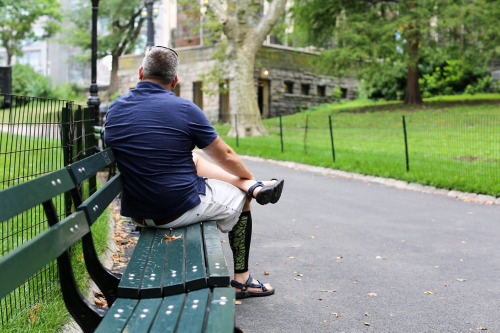
(1/3) “I was inside an armored carrier with my platoon commander. He tried to open a pressurized fuel container and it sprayed across the vehicle and hit a camping stove that he was using to make hot chocolate. It burst into flames. He dropped the fuel canister and fire covered the floor. Then he caught on fire. He grabbed onto the exit hatch and wouldn’t let go. I couldn’t pull him away. And he wouldn’t let go. And the vehicle is filling up with flames. It was so fucking hot. It’s like when your hand is on a stove except you can’t pull it away because it’s your whole body. And it’s so bright and I can hear him screaming. And the hood around my neck is shrinking and tightening. And my Gore-Tex uniform is melting and spreading and falling off my body. And I could feel myself burning and I couldn’t take it anymore. I gave up. I didn’t want to burn to death. I decided to take a deep breath to singe my lungs and close my throat. Then the hatch opened. Someone heard us screaming and opened the hatch.”
August 16, 2016
(2/2) “We celebrated my Dad’s 50th birthday two weeks before. ...
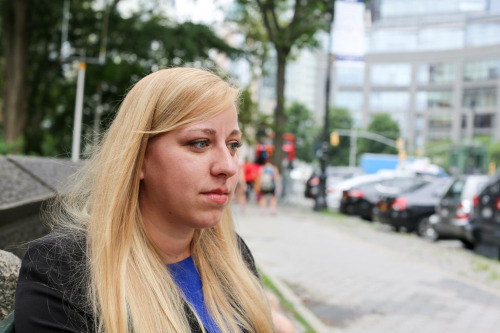
(2/2) “We celebrated my Dad’s 50th birthday two weeks before. It was a surprise party. I wanted to borrow Stephen’s truck to help pick people up from the airport, but he wouldn’t let me. He tried to stop me in the driveway. But I took it anyway because I’m the older sister. He was livid. That truck was his baby. He ignored me for the entire party and we never spoke again. My last conversation with my brother was a fight. I can’t change that. My mom said that Stephen called her during those last two weeks and forgave me for taking his truck. But I think she’s just telling me that so I won’t feel so responsible. I’m not saying that the fight caused his suicide. But we could have talked it through. We were eighteen months apart. We used to drive to school together every single day. If I hadn’t fought with him, he would have felt comfortable calling me. And we could have talked it through.“
(½) “Everyone who comes back from deployment fills out a...
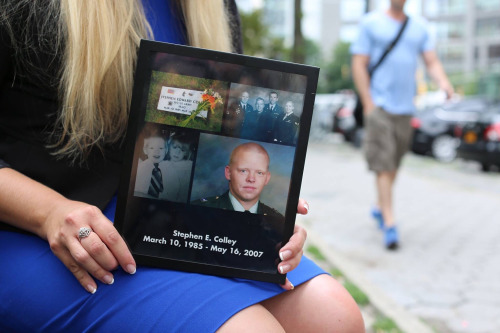
(½) “Everyone who comes back from deployment fills out a form. It’s a standard psychological evaluation. It asks about drug use, sleeping habits, things like that. We filed a Freedom of Information Act to see Stephen’s. He checked a box that said he thought about suicide. And they sent him home. The counselor just scheduled a sleep study and sent him home. And he hung himself with an electrical cord. Stephen should have never been a soldier. He was a happy, go-lucky guy. We used to go camping all the time when we were little. He disappeared from the campsite once and we found him in the woods with chipmunks in his hand. He never wanted to hurt anything. If there were ever ants in the house, he would take them outside. He never told me about the war. I don’t know how it affected him. And I can’t say what caused his death. Personally I think it was PTSD. But his wife had recently left him. He’d gotten demoted. But it doesn’t matter. He told them he thought about suicide. He checked that box. And they still sent him home. So whether it’s right or wrong—I do blame them. If someone says they are thinking of suicide, you need to listen.”
August 15, 2016
(4/4) “He didn’t even tell me he was enlisting. He called his...
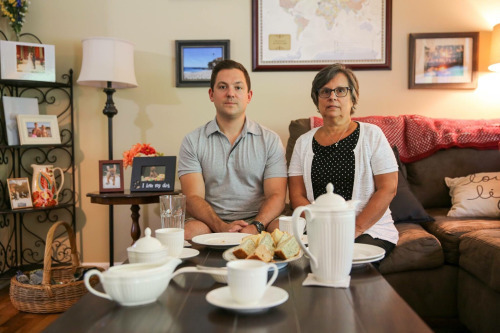
(4/4) “He didn’t even tell me he was enlisting. He called his dad one day and said: ‘Don’t tell Mom.’ I remember it was Halloween. We were trick-or-treating with our grandson, and I noticed that my husband was walking ahead of me, whispering with my son-in-law. When he finally told me, I supported his decision 100%. I think it was a defense mechanism. I focused on supporting him so I wouldn’t feel afraid. I just didn’t want the military to change him. I raised four children. I knew how each of them was different. Chris was the one who felt things the deepest. He wanted to help people. And I didn’t want him to see something that changed him forever. That was my prayer every night. Other moms in our town had sons who went to war. I’d heard stories. They told me that their sons had seen too much. They just weren’t the same when they came home. When Chris first got back from Afghanistan, I didn’t notice much difference. He seemed to be spending less time with us, but he was recently married, so that seemed natural to me. But one night he came over and asked us all to sit down at the kitchen table. He said: ‘Mom and Dad, I want to tell you something.’ I thought he had cancer. But he said: ‘I’ve been diagnosed with PTSD.’ When I heard those words, my heart sank. I thought it meant forever. I thought it meant a lifetime. But he explained to us that he was getting treatment. And that it was going away. My husband is a retired police officer. After Chris left, he said to me: ‘I’m so proud of him for talking about this stuff. Because I never did.’”
(¾) “Sometimes my anxiety would get so bad that I’d turn...
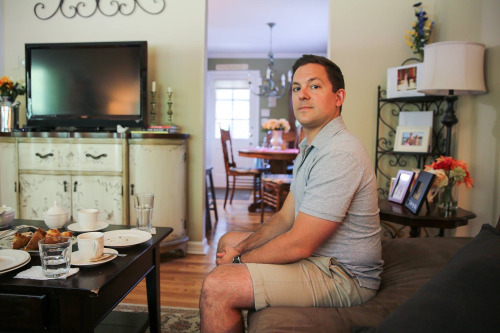
(¾) “Sometimes my anxiety would get so bad that I’d turn completely white. I’d shoot out of bed some nights, and my heart would be racing, and I’d start running around the room trying to find stuff. My wife would have to physically put me back to bed. Then one day I was taking a train out of Hoboken, and we were passing through these wetlands, and there were all these reeds, and it reminded me of Afghanistan. And I looked down at my phone and there was a Facebook post commemorating the anniversary of the death of a guy in my company. And I got dizzy and couldn’t talk. I thought I was having a heart attack. I just couldn’t take it anymore. I had to get help. I went to the emergency room at the VA and was diagnosed with PTSD. Eventually I found my way to Headstrong Project. At first I dreaded going to therapy. I went through a treatment called EMDR. My therapist would take me back to every point of trauma and have me describe it in detail. It was like literally going back in time. I could touch the faces of all the guys I’d lost. I could talk to them. We could talk about what happened. And how we all knew the risks. And how sometimes people died. And it was nobody’s fault. And I could apologize to them. And when it was over I’d be completely exhausted. And I’d feel like a bitch because I’d just cried for an hour. But it worked. The symptoms started to go away. After a few sessions, I remember walking into my therapist’s office and saying: ‘This stuff actually works!’ And he said: ‘Yeah. It does.’”
(2/4) ‘If you don’t do your job, people will die.’ That...
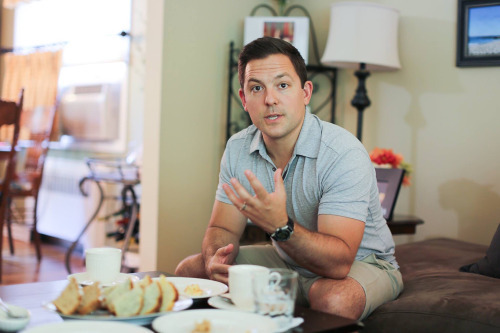
(2/4) ‘If you don’t do your job, people will die.’ That message was hammered into our heads during officer training. Even if you tied your boots incorrectly, an officer might get in your face and scream: ‘You don’t care about details! Details get people killed in combat! You’re going to get people killed!’ Over and over, it was drilled into me that people would die if I messed up. And nine of my guys died. So it’s been extremely hard to forgive myself. Maybe I didn’t work hard enough. Maybe I didn’t set high enough standards. Maybe I didn’t put enough stress on the importance of details. The first guy in my company who died stepped on a bomb that was hidden under a footbridge. That was a rule. That was a detail. We were never supposed to walk over footbridges. He knew that. Maybe I didn’t tell him enough times. I can see his face right now. If he was sitting here, I’d say: ‘Mike. You weren’t supposed to do that. You know you weren’t supposed to that!’"
(¼) “I was in charge of 250 Marines during my second...
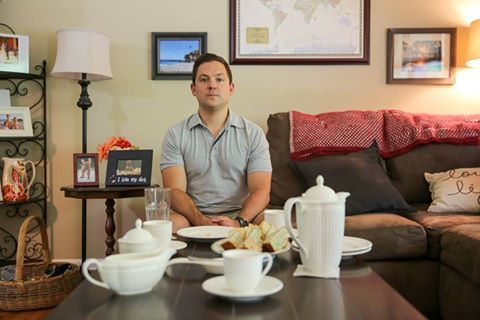
(¼) “I was in charge of 250 Marines during my second deployment. We were assigned to a district called Sangin. Most of Afghanistan’s poppy was grown there, and the heroin it produced funded the Taliban’s war effort. We didn’t have a clear mission. Our job was to establish a ‘presence.’ We were supposed to make the Taliban as uncomfortable as possible. Our mission wasn’t to take any hills or to kill a certain number of enemy combatants. And that lack of clarity could be frustrating. Guys were getting killed but we had no concrete ways to measure our gains. The best I could do was tell them that our mission was to ‘make Sangin a better place.’ Every day I’d send them on patrols. I’d sit in a small mud room, square like this, with maps on the walls and a radio on the table. And the patrols would call back if they needed support. Some days it was chaos in that room. Multiple patrols would come under fire at the same time and they’d all be calling at once. We lost nine guys over those six months. Dozens more lost arms or legs. Others had serious gunshot wounds. I remember sitting on an ammo canister the day before we left, with my head between my knees, wondering if we’d done anything at all. And a village elder came up to the gates of our base. He wanted to thank us for making the area safe enough so that his village could finally return to their homes. That was the only tangible difference that I’d seen in six months. It was the ray of light I needed.”
August 11, 2016
Many of you remember Sara from the Pediatric Cancer series last...
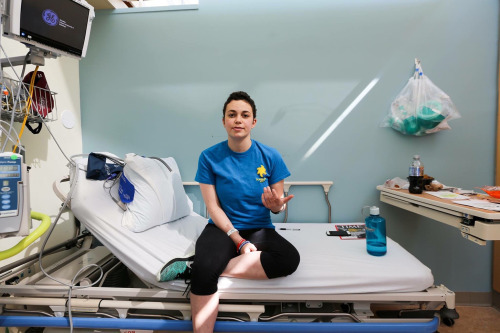
Many of you remember Sara from the Pediatric Cancer series last month. I’m very sorry to report that shortly after her story was published, Sara’s cancer returned very aggressively. Yesterday morning she passed away. I’d like to honor her by reposting her story, and allowing Sara to be remembered by her own words:
“My biggest worry is that I’m going to die and not do all the things I wanted to do. The funny thing is—I didn’t even realize how many things I wanted to do until I got diagnosed. Simple things like meeting a guy, getting married, getting a job, having my own apartment, and even picking out my own furniture. Those never seemed too interesting to me. They just seemed like adult things that were guaranteed to happen. Now I want to do them so bad. Because I want to know what they feel like.”
——————————————————
Our fundraiser for Pediatric Cancer research at Memorial Sloan Kettering is still active. If you’d like to make a donation in honor of Sara, you may do so here: http://bit.ly/1NZZMFc
Brandon Stanton's Blog
- Brandon Stanton's profile
- 769 followers



